Growing Up with I Spit on Your Grave, I Spit On Your Grave, I Spit on Your Grave: Deja Vu (1978, 2019)
Directed by: Meir Zarchi, Terry Zarchi
Written by: Meir Zarchi, Terry Zarchi
Starring: Camille Keaton, Eron Tabor, Jamie Bernadette, Richard Pace
I SPIT ON YOUR GRAVE: THE COMPLETE COLLECTION
ON BLU-RAY AND DVD: 5TH OCTOBER, from KALEIDOSCOPE HOME ENTERTAINMENT
PART ONE:
I SPIT ON YOUR GRAVE [1978], GROWING UP WITH I SPIT ON YOUR GRAVE [2019], I SPIT ON YOUR GRAVE: DEJA VU [2019]
New York short story writer Jennifer Hills rents an isolated cottage by a lake in the countryside to write her first novel. Her arrival attracts the attention of gas station manager Johnny, plus Stanley and Andy, two unemployed youths. When Jennifer receives a grocery delivery from the mentally challenged Matthew, he tells the other three about the beautiful woman he met, claiming he saw her breasts. Stanley and Andy start cruising by the cottage in their speedboat and prowling around outside the house at night. The next day, while Jennifer is relaxing in her canoe, they surprise her in their boat and tow her to shore so that Matthew can lose his virginity – though they also want her for their own amusement….
There was always something ominous, even wrong, about I Spit On Your Grave way before I got around to watching it. During my late teens in the late ‘80s, I did what I many UK-based horror fans did; obtain bootleg videos of all these great sounding horrors that were either banned or heavily cut. I read positive reviews of many of these, but I Spit On Your Grave didn’t seem to be liked by anybody, and did I really want to watch a film where a woman was raped for an hour? Consequently it took me a long time to get it, and when I did the copy was very poor – but God the film hit me, and half way through I actually had to stop the video because what I was watching almost made me throw up. But was it actually a good movie? That’s something that took a while for me to decide, but I did eventually come to the conclusion that it was indeed one of worth, despite soon becoming aware of Roger Ebert’s famous review which typifies the general response where he called it “a vile bag of garbage…sick, reprehensible and contemptible….without a shred of artistic distinction”. I felt that writer/director/editor Meir Zarchi was right to make me want to stop the film and nearly be sick that first time, to show us sexual assault in all its horrible detail. But was I some kind of sick weirdo for thinking this? The rise of the internet soon let me know that, actually, I wasn’t alone. I Spit On Your Grave did have its defenders, many of them actually being women, and eventually becoming friends with a rape victim who, while she didn’t wish to see the film herself, had read a lot about it and was totally in favour of it existing, clinched it for me. We were – well – maybe not many, but certainly a fair few.
Zarchi was inspired to write it after an incident where he, a friend, and his daughter were driving by a park when they witnessed a young woman crawling out of the bushes bloodied and naked, having been raped and with her jaw broken. They took her to the police. It was shot under the title Day Of The Woman in Kent, Connecticut, on a budget so low that the equipment used was so old causing much of the dialogue to be recorded out of synch. The electrician and the makeup artist both walked out during filming of the rape scenes. It had trouble getting released, a limited, heavily cut to get an ‘R’ rating by Zarchi himself not achieving much. Then exploitation distributor Jerry Gross agreed to released it uncut [in some places still with the ‘R’ rating on the poster!] and wide as long he could change the title to I Spit On Your Grave, a title that Zarchi still dislikes. It drew instant notoriety and hatred, and Ebert and fellow TV critric Gene Siskel and Ebert’s began a crusade against it, something they also did for the comparatively tame Friday The 13th. Here in the UK it ended up second on the DPP’s list on Video Nasties, and even as censorship has loosened it’s still caused problems for the BBFC. The 2001 DVD release was a whopping seven minutes shorter, though some shots were repeated to try to make up for some of the lost running time. The 2010 cut one lost just three minutes, this time the decision being taken to slow some of the footage down. I haven’t seen either of those versions. It seems that Kaleidoscope re-submitted the film to the BBFC, probably hoping that they’d pass it uncut, but unbelievably they STILL demanded edits, though not as many. More on this later.
A pan up to the apartment that she’s temporarily leaving introduces our heroine and the life that she’s getting away from. As she arrives at the place where she’s hoping to do some serious writing in solitude, one is struck by the leisurely mood and the simple but effective visual style with an emphasis on long-distance shots which usually place Jennifer right in the middle of the screen. The beauty of the countryside around the house Jennifer is staying at is emphasised greatly, and one sees that this could really have be a wonderful haven for the successful city girl from the hustle and bustle of her normal life. She seems totally at home sunbathing and swimming in this paradise, which she does scantily clad or nude, though Zarchi seems to be playing with the male gaze here, panning away to show Jennifer as a tiny speck when she takes her swim when we’d expect to see the moment exploited in a sexual fashion. I’ve have reviews which claim that the film is saying she’s asking to be raped because of the way she likes wearing few or no clothes, because of her novel – which is basically about herself – mentioning “the men who made love to her” which gets a horrible echo later on, and the way she’s very relaxed and friendly with the men. It isn’t, something emphasised later on in a crucial scene, and I honestly think that anyone who thinks it this needs their head seeing to. How on earth is having a heroine who’s comfortable with her body and seems to be a very sexual person tantamount to meaning she deserves to get assaulted? Saying that, I do question the amount of screen time that Camille Keaton is naked or semi-naked. Keaton is a beautiful, sexy woman, and I as a male viewer enjoy seeing her in these states, but were all these moments necessary?
In any case, I’m always more bothered by the simplistic plot device of the previous tenant having left a gun [but nothing else] in a bedroom draw – well, how convenient! An early chat between the local men who she encounters reveals their attitudes to women, as well as perhaps suggesting a subtext of poor folk resenting the privileged rich folk who come and stay in their territory which isn’t followed through, placing the film in that cycle of ’70s horror films where city folk intrude on the countryside and pay for it. We get no background on them except that one has a job and is married with kids, but I don’t think it matters really. Johnny, Stanley and Andy are obsessed with getting Matthew laid, even if he doesn’t seem too bothered, and somehow think that attacking Jennifer first will inspire him to do the deed. They genuinely don’t seem to think that they’re doing anything particularly bad. The sequences are long, ugly, and as un-erotic as you can get. During the second attack, Jennifer is assaulted anally and lets out a scream which is possibly the most harrowing thing I’ve ever heard in a film. And this was where I had to turn the film off and almost vomited over the sink during hat first viewing, and yet – isn’t this how one is supposed to feel when watching such a woman being raped?
I’ve read that the film eroticises rape, makes it look inviting. Even Siskel and Ebert said this. My answer to that is, with all due to respect to Ebert who is generally a critic I like greatly; if I was sitting next to someone watching the film and that person said the scenes had been made erotic, I’d be seriously worried about them, especially with the way Zarchi also dwells on the aftermaths, lingering on the muddy, bruised, bloody form of Jennifer as she desperately tries to get away. I think that the critics who said this just had trouble handling the graphic nature of the scenes and felt they had to hate on them. Of course questions about how far a filmmaker should go in showing seriously nasty things can’t help but be raised. During the third and final assault, it’s especially unpleasant to watch the mentally challenged Matthew being forced to join in by the others. The role of this particular person is very important, an element which was all-but-botched in the remake. Matthew shows himself to actually be more intelligent than the others rather than less so because he clearly has a sense of what’s right and what’s wrong, and thinks before he acts, even if one wonders why on earth the others send him to finish Jennifer off when they’re not present – it seems to me that they wouldn’t trust him to do the deed and would enjoy seeing her death. Still, he’s quite well played by Richard Pace for the time; occasionally he sometimes seem to act like he’s in a silent movie, but for the most part he makes a solid attempt to play the role in a realistic, non-cartoonish fashion.
It’s worth mentioning here the cuts that have been made to this version. This is the least censored of all the UK editions, though it’s possible to still get angry and find it baffling that the BBFC are still not allowing people who live in the UK to see a 1978 film in the form its makers intended while the censor boards of many other countries let it be released uncut. I’d say that the rape sequence in Irreversible is just as upsetting to watch, though I guess that was passed uncut because that film was considered to have artistic merit. I’d personally consider Irreversible to be a masterpiece, but this still shows that a certain snobbery still exists at the BBFC, even if one can appreciates that the way the rape in Gaspar Noe’s film is shot, with the viewer being made to be feel implicated by the one stationery camera observing the act, makes things more complex that anything Zarchi can come up with. In Kaleidoscope’s version, during the first rape I wouldn’t have even noticed the brief edits if it wasn’t for a jump cut. The third has the most missing, with Richard beginning to rape Jennifer obviously being the most contentious bit, though you wouldn’t necessarily notice that stuff was not there if you hadn’t seen the film before, because the editing is fairly well done. In fact I’m going to say something that I thought I’d never say – the removal of 1.49 minutes only slightly lessens the impact of the scenes and did actually make me wonder if Zarchi needed to be as extreme as he did. It’s still very strong stuff and will upset many. If it’s between this and the film not getting a UK release at all, the former is infinitely preferable.
Now it’s been said that the revenge scenes are crass in the way Jennifer that uses her sexuality, and are too brief in comparison with the rapes, but others think it’s important and empowering that she uses her greatest weapon to aid her task, while such acts as a castration in a bath and a strangulation by rope would have been silly if they’d been any longer. Anyway I don’t think that Zarchi, while still being on her side somewhat, is supporting what she’s doing 100%. For me, the best part about movies like this is seeing the bastard scum get what’s coming them and have no shame in saying this, but this one is quite ambiguous and questioning, especially when Jennifer decides to kill poor Matthew first, a scene where it doesn’t feel that we’re particularly meant to cheer, and which is even more disturbing when you learn that the actor is nearly being choked to death for real due to a mishap on set. And Jennifer seems to get no joy after each killing. There’s a really quietly powerful moment where, after one murder, she rocks back and forth in her rocking chair while playing opera on the record player. Her face shows no happiness or even sense of achievement. It’s just cold and emotionless. Killing these guys won’t make her feel better. Keaton, granddaughter of the legendary silent comedian Buster, really is pretty good in the part, especially seeing how grueling it is; she performs her character’s agonising crawl inside her house especially well. Of course her being in this film obviously didn’t do her career any good, and lets just forget that she also starred in that dire semi-sequel Savage Vengeance where she had to change her name when Zarchi sued the producers. If you want to see a rape/revenge flick that is bad, check this one out but don’t say I didn’t warn you!
Zarchi’s direction is a touch uneven, with well staged and even elegant sequences alternating with clumsy ones, but for a first-time director he’s okay and could have gone on to do more than he eventually did. He does have a tendency to let scenes where nothing is happening play out for a long time, and you could probably cut 15 minutes or so to tighten things up, but I like the lingering scenes where Jennifer is alone, especially when she pieces her ripped-apart manuscript back to together just like she’s trying to piece her life back together; Keaton is good in these too. Some of the acting from her co-stars is a bit ropey in places, but Eron Tabor as Johnny the ringleader has moments when he’s pretty good. There being no music score actually really adds to the disconcerting realism of what we are seeing – and what we know we’re going to see. I’ve spent most of this review sticking up for I Spit On Your Grave, and yet I don’t want to make claims for it to be a towering artistic masterpiece with a huge amount to say. There are times when it’s sloppy [though not really any more so than many other low budget horror films of the time which are far better regarded critically]. I never fail to be astonished at how nearly all of Jennifer’s wounds are able to heal in just two weeks, and how Johnny barely reacts to seeing the woman he’d raped and thought was dead alive right in front of her; but do we put this down to poor acting or poor direction?, However, I think that it’s a more thoughtful and well put together film than its reputation, and the fact that it is indeed rather horrible in places doesn’t stop it being of worth. That it has, in my opinion, been so misunderstood by critics who are rightfully repulsed and refuse to think any further, is a great shame.
Rating: 









SPECIAL FEATURES
While I was only able to view digital screeners, I decided to offer some thoughts on the two audio commentaries for I Spit On Your Grave seeing as I already owned them.
Audio commentary by writer/director Meir Zarchi
This and the second audio commentary are new to the UK and exclusive to the Blu-ray release of this set. The two tracks come from the 2001 Region 1 DVD. Zarchi comes across as rather arrogant at first, proclaiming his film to be “truly a masterpiece of cinema“. However, it turns out that he’s actually quoting from a variety of reviews both good and bad. Although his thick accent means that you have to listen carefully, he provides an excellent track, full of detail about the production. We hear what happened when a sacked production manager got his own back by telling the priest in a church they were filming that a pornographic movie was being made, about the sole time it all got to Keaton, and that when you see a scar on her face it’s actually a real permanent injury that she bears which is usually disguised with makeup. He’s still shocked by some of what he shot but is proud of the movie, and I don’t think that anyone will come away thinking that he didn’t make it with good intentions.
Audio commentary by cult film critic Joe Bob Briggs Blu-ray exclusive
Cult film critic Joe Bob Briggs provides a quite excellent audio commentary which does very much what I attempted to do in my review; offer a critique of the film, defending it against the criticisms that have been made against it though pointing out a few flaws too. Right from the beginning where he says, “looks like a muscle car that took two many steroids” in relation to Jennifer’s vehicle, he manages to sometimes be humorous in his observations without coming across as crass, though is repeated use of the word “retard” in relation to Michael grates when heard today. He tells us that the ‘R’ rated version was cut by a whopping 17 minutes and makes a strong case for the film to be feminist, and – while he does often resort to describing what’s taking place on screen, he does it in a wry fashion and points out lots of details. These two tracks are both essential listening.
Excerpt “Why Zarchi Made ISOYG 1978”
Terry Zarchi 8mm film with Camille Keaton
Growing Up with I Spit on Your Grave – full length feature documentary available on disc 2 of I Spit
On Your Grave: Original (Special Edition) – explore the myths, impact and legacy of the
unforgettable 1978 film, packed with never-before-seen footage and exclusive interviews
The story of the conception, filming, effect and legacy of one of the most controversial movies ever, from the son of the director….
While one can still complain how I Spit On Your Grave is still cut in the UK, with some of its scenes still contravening some bizarre law about sexual violence on screen, its latest incarnation wasn’t found to be too shoddy to this critic in this respect. And in fact if one ignores the censorship, the film has actually been quite well served on home viewing, at least in North America, where it’s had lots of releases and those two audio commentaries. However, while the commentaries were certainly both worth a listen, something was missing from all these versions. None of them contained a comprehensive ‘making of’, even though it was obvious that this was a film that would make for a great documentary with seemingly so many stories to tell. This offering from Terry Zarchi the director’s son who narrated, edited, directed and who’s undoubtedly the major force behind it, came out last year and of course I bought it soon after. It drew surprisingly little attention considering the fame of the film which it’s about, and this might lead one to believe that it’s not very good. However, don’t be deceived; this is far from the case even on a second viewing, and hopefully the fact that it’s finally been included with I Spit On Your Grave will lead to it being more widely seen. Kudos to Kaleidoscope for including it in this set.
Growing Up With I Spit On Your Grave has its minor issues that needled me a bit, such as different title cards popping up every few seconds as different things are discussed – for goodness sake, one of them just says ‘About Tent, Connecticut’ which was where the film was shot. We could have lost at least half of these title cards and I don’t know why so many of them were thought to be necessary. But this is generally a very well paced and edited documentary, and I have to say I learnt a lot – though granted I haven’t yet read any of the books about the film [much like movies, for me it’s often a case of too many books not enough time, especially if the books are about films]. Some of the information I’d heard in Zarchi’s audio commentary. However, I didn’t know that, for example, the script which cast members read had a pretend female name as author to soften their response, that most of the technical staff were volunteers, that actor Gunter Kleeman kicked star Camille Keaton for real and injured his back while throwing himself into a rape scene, and that Roger Ebert’s hypocritical, small minded [he based much of his review on the disturbing way some audiences members reacted to the rape scenes during the viewing he was at] campaign against the film was so extensive that it halted its release in many American cinemas – even though said review no doubt added to the film’s success on video, and the film has most definitely lasted so Zarchi and company definitely had the last laugh.
It begins unsurprisingly with the different viewpoints and various questions asked about the film, such as whether the revenge justifies the rape, and what Zarchi’s motives were in making it. I knew that he was inspired by picking up a rape victim while driving by a park with some others, and that the reaction of the local cops wasn’t particularly unsympathetic. But it’s nice to now see this being told, and in more detail. I don’t remember learning before that Zarchi began typing a screenplay the same day he arrived home after the incident. Keaton, Kleeman, and Eron Tabor, who was chosen because Zarchi’s mother thought him to be better looking than the person originally cast in the part, soon show up as we move through the conception of the project. I’ve always admired the way Keaton continually supported I Spit On Your Grave even when she split from Meir Zarchi after a brief marriage in 1981. I guess haters of the film who are still curious about watching this documentary will find it baffling when she talks about her love of the part when she first read the script, but then it’s a fact that plenty of women have praised and defended it, possibly more than men. Special effects man Nouri Haviv, plus a few others including Meir’s daughter Tammy plus Terry himself, soon turn up as we go through the filming and we hear how, for example, when Keaton had a minor breakdown when asked to roll off the rock [anyone who’s seen the film will know the rock I’m talking about] onto a tree, only Zarchi doing the act himself naked got her to do it, and how the effects were done. Seeing as it’s a dying art, I always love hearing about how low budget practical effects were done in the days before CGI, especially when the solutions seem absurdly simple.
For the most part, it seems like a good time was generally had during filming, which was obviously a far cry from the tension-filled, genuinely uncomfortable shooting of Last House On The Left. As we go into the release and distribution, fans may learn a bit less, though the suggestion that Demi Moore’s behind is what’s on the iconic poster, something that I found so ridiculous I didn’t even bother to mention it in my review of the film, is surprisingly addressed for some time and I do now wonder. Distributor Jerry Gross’s prominent role in the success of the picture now is rightfully given prominence, even if Zarchi still hates his re-titling from Day Of The Woman, and then we get a lot of rather-too-quick snapshots of various people discussing the film and often bringing up some very good points. Much as I’m a fan, I did think, for the sake of balance, that we should have been shown more folk attacking the movie than one sole guy and some excerpts from Siskel and Ebert, plus Ebert on a later programme. But hearing and seeing a rape victim’s positive reaction is probably worth far more. And then the documentary ends with a coda of Meir Zarchi reuniting after many years with Keaton and Haviv who sadly died six months after agreeing to do the cinematography on the sequel. Some might find this material to be unnecessary or there to be too much of it. I thought it to be rather touching, though personally I’d have placed this stuff at the beginning of the documentary if I’d made it – I think that it would have made an excellent introduction before we then flashed back.
One may have wished for just a few things. I wanted to see fuller versions of some of the interviews with people who liked or disliked the film towards the end which were obviously cut down to the bare minimum; somehow I can’t see a future special edition coming out especially what with this streaming obsession that’s taking over. I also really wanted to see and hear from Richard Pace who played the extremely difficult and even complex part of Matthew, the mentally challenged teenager who’s forced into joining in the raping; he gave quite a good performance in a time when portrayals of people with learning difficulties weren’t generally known for their sensitivity. But of course it’s not the fault of Zarchi or indeed anybody else that they couldn’t get him. Overall I think that Growing Up With I Spit On Your Grave, which only contains small clips from the most graphic scenes and in fact hardly shows any rape at all so should have probably been distributed more widely than it has, should delight fans. I wrote in my initial review of it that it may even get some folk who are decidedly not fans but who are nonetheless curious enough to watch the documentary, to check out the film again and maybe re-evaluate their opinion of it.
Said initial review of this complained about it not being on Blu-ray, but of course that’s no longer the case which now makes that older write-up out of date. We finish with a bit about the remake and its sequels – and then some stuff about I Spit On Your Grave: Deja Vu, the direct sequel to I Spit On Your Grave which was long in coming, the script of which Meir Zarchi wrote years before it eventually got made. Was it worth the wait? Read on….
Rating: 









WARNING! MAJOR SPOILER IN PARAGRAPH FIVE!
It’s 40 years after Jennifer Hills killed off the men who horribly raped her and then left her for dead. She wrote a book about the ordeal and is now working as a rape counsellor. She also has a daughter, Christy, who’s become a very successful model. However, the past comes back to haunt both of them when they’re suddenly kidnapped by Becky, the widow of Johnny one of the rapists that Jennifer killed, and her two sons. After nearly being hung by Herman, the equally mentally challenged father of Matthew who Jennifer also killed, Jennifer escapes, but by this time Christy has been taken somewhere else. Mother and daughter desperately need to find each other but they’re in very hostile territory….
148 minutes? Those were the words I uttered in astonishment to myself when I first saw I Spit On Your Grave: Deja Vu. How on earth could it be so long? It would have to be really good indeed to justify that length. The long-in-coming sequel to I Spit On Your Grave was written by the writer/director of the original Meir Zarchi a long time ago, and seems to have actually been made several years back, but its distribution was either held back or it struggled to get a distributor. Seeing the incredibly low rating that the film has on the IMDB, one could assume that it was because it was of very low quality. While I’ll say right now that it does have a lot of other problems, the main one is that darn length. The film is rather like a rough cut that hasn’t been edited down properly, with a lot of scenes that go on for ages or are just plain unnecessary. Of course I have no problem with extremely slow dialogue-heavy films if the dialogue is good, the acting is good, and this approach suits the kind of film it’s trying to be. But this is basically just a revenge thriller, yet it seems that Zarchi was just unwilling to cut anything from his film even though he’s had loads of time to do so if he wished. This might be understandable if it was well directed, but Zarchi seems to have lost much of the crude but undeniably effective skill he displayed in the original. Does the result still work in places despite all this? I’d say that it does, but only very sporadically, and this movie requires you to have to overlook some things that are just darn hard to overlook, like several scenes where people just turn up at the right place and time to push the film onto the next scene almost as if they have psychic powers and teleportation devices, or awesomely idiotic behaviour by our two heroines. For example: if you see a villain coming towards you with a knife, would you really turn your back on him and start banging on a door?
Even die-hard fans of the original are probably unlikely to say that its story needed continuation, but nonetheless the basic premise for the sequel does have merit and could work if the film was inclined to really examine the issues raised. Jennifer kills her rapists in 1978, but nobody thinks about the friends and family who would be badly affected, probably for life, by these deaths. These people might not even have any idea of the things that the killed ones got up to. Deja Vu takes that idea as a starting point, but largely screws it up because we aren’t made to feel nearly enough sympathy for these affected people, and therefore aren’t made to sympathise with their own crusade of revenge much. They’re also just plain weird, over the top and sometimes depraved country hicks who aren’t even scary for much of the time, just irritating if occasionally funny. I’m sure that, if the film was being widely seen, snowflakes would be whinging about the stereotypical, exaggerated depiction of backwoods American types. Unsurprisingly I wasn’t offended myself, but I still found the portrayal disappointingly one-note and simplistic, Zarchi’s idea of depth being how they go on and on about how city folk look down upon them. “You think we are not humans just because we are not big-city folk like you. We fear god and we pay our taxes too, We’re mighty proud of who we are”.
Still, it’s interesting to visit Jennifer so many years later. She’s managed to made constructive and beneficial use of her ordeal and has been able to have and raise a daughter. After a few flashbacks to 1978, we get some shots of the barely changed garage and its surroundings in 2018 which have a rather haunting effect, and hear parts of an interview with Jennifer on the radio. We see a woman ring a man and as him, “Are you listening”? Now surely, if Jennifer’s already published this book about her experience entitled ‘I Spit On Your Graves’, wouldn’t she have been tracked down much sooner? Anyway, we now see Jennifer having lunch with her daughter, and the scene goes on forever. We do learn some background about both characters, but much of the dialogue is really poor, and sad to say, Camille Keaton, whose performance in the original I admire and who I admire as a person too, seems to have forgotten how to act. Her timing is often dreadful! Anyway, the two are shoved into the back of a van called ‘Enola Gay'[!] , and we then get another inordinately lengthy scene in which matriarch Becky rambles on and on and especially about how Jennifer [in her opinion] got aroused when she was seducing her son and chopping off his dick in the bath. As I was rather enjoying Maria Olsen’s weird but rather committed performance, I never lost interest, but most viewers will probably be of the opinion that some judicious cutting of the scene to its essentials should have been done. Jennifer then escapes from being hung in a bit as un-excitingly staged as possible, then hunts for Christy while Becky, Kevin and Herman are on her trail. Meanwhile Christy gets away from Scotty by whacking him between the legs with a stick, and – well….
SPOILER BEGINNING – the film then pulls its biggest trick which may please some who like surprises, but which may disappoint many others. In Psycho fashion, the film kills off Jennifer. I personally found this to be a huge let down and a rather cruel treatment of this character, a character who once survived a truly horrible ordeal and has been now made to revisit it. It also allows the rest of the film to be more simplistic, as the focus becomes totally on Christy and the film becomes a virtual remake – SPOILER END. There are many deliberate parallels to 1978, from Christy doing her mother’s quietly powerful ‘rocking in a chair’ bit, to one of the rapists ‘coming’ at the point of death. Well, at least you can’t say that the title isn’t descriptive of the movie. This time the rape has a lesbian element, and involves not a mentally challenged teenager but a mentally challenged old man who doesn’t want to join in the sexual assault. The scene doesn’t become anywhere near as uncomfortable as its parallel scene from 1978, Zarchi seeming to want to steer clear of controversy this time around, and therefore it has not been cut at the behest of the BBFC nor should have much censor trouble in general as long as the film’s rating is kept the equivalent of ’18’. Having said that, requiring said mentally challenged old man to do some very random things to move the plot along is a bit crass. But then by now we’ve had things like Christy run off into the forest and within seconds run straight into the bad guys who are standing around at the exact spot for her to run into. This is a rare scene in this film where some extra footage would have actually been welcome, though a total re-staging would have really been the thing to do.
Fans of this genre will enjoy the gruesome ways in which revenge is enacted, with a particular emphasis on bloody damage to the groin area. The simply done effects are perfectly fine and the drawn out nature of these set pieces is not necessarily a problem. But an increasing amount of footage just consists of these backwoods yokels yelling at each other and behaving oddly, and come the final act it’s more as if we’re watching a failed attempt at a dark comedy, which is surely a betrayal of things. Perhaps the rather elderly Zarchi was unwilling to reign in his performers. As well as Becky and company, there’s also an old married couple who drive around in a very noisy car, the even noisier woman constantly swigging from bottles of liquor. These characters would really work in the right film, but mostly just annoy in this one, and it becomes rather sad that Zarchi not only appears to increasingly be going for laughs [for goodness sake we even have some Spitting On Graves] but totally dispenses with any realism towards the end. We’re also virtually given several endings to a film that doesn’t seem to know how to stop – though to be fair the pace is finally ramped up here. There’s also a revelation that may be a twist to some, though without intending to boast [I’m normally terrible at guessing twists], I was actually expecting it, seeing as one particular issue was clearly being avoided in the early scenes. One thing that I was impressed with though was the acting of Jamie Bernadette, especially in the later sections. I gather that she’s become a bit of a scream queen favourite in films like All Girls Weekend and The 6th Friend which she also co-wrote, and as well having the looks she can certainly act. Her role in Deja Vu really allows her to show her range, though the hardly great quality of the film probably isn’t helping in getting her fantastic performance noticed.
Deja Vu does sometimes made a good attempt at replicating the aesthetics of I Spit On Your Grave, but then tends to lose it at the last hurdle. There being no music score was a device that really worked well in 1978, but the sound effects for this one are often overdone, and towards the end some scoring does crop up. Overall this film is hardly terrible despite what you may have read: it certainly has its interesting aspects and well done scenes, and rape/revenge movie lovers will definitely find enough to enjoy despite the acres of sometimes extraneous footage that they will have to wade through to get to the good bits. A thorough editing job losing at least half an hour could possibly work wonders, and I wouldn’t be surprised if tighter, punchier fan edits soon make an appearance. If I had the time I’d attempt one myself, as I really wanted to like this film. But instead, I can’t help but wish that Zarchi, Keaton and company hadn’t bothered, and had just left their perennially problematic but for the most part [in my opinion] very good original film alone. After all – love it or hate it – they made a film that will never go away and will no doubt still have people talking in another 40 years time, by which time this half-assed sequel will probably long have been forgotten.
Rating: 









SPECIAL FEATURES
• Audio commentary by cult film critic Joe Bob Briggs (Blu-ray exclusive)
• 10x behind-the-scenes clips

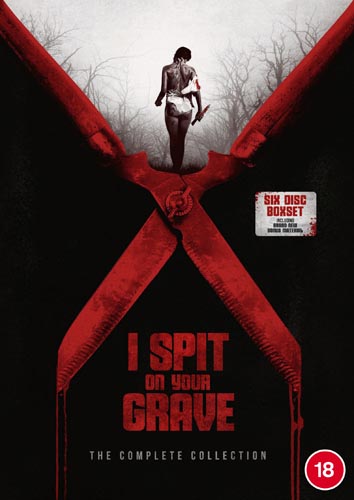
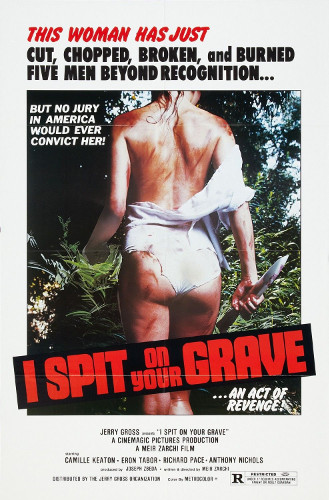
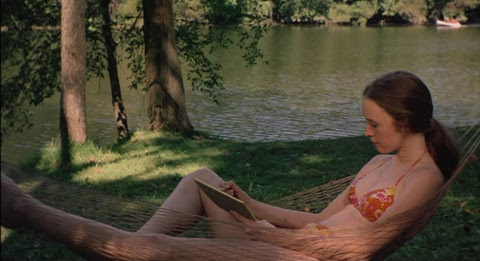
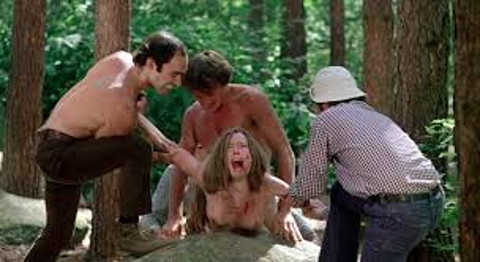
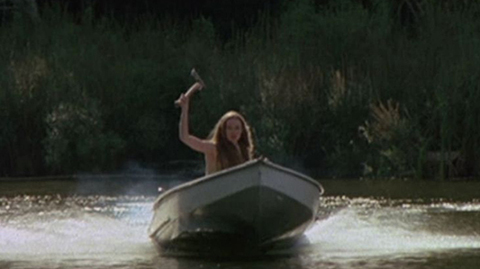
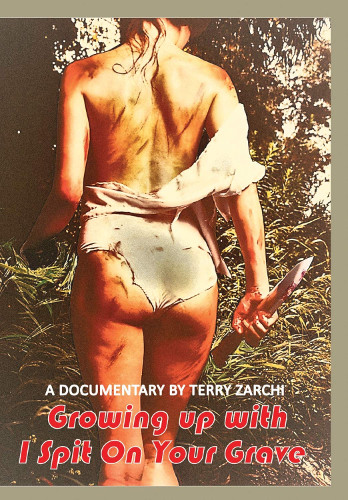
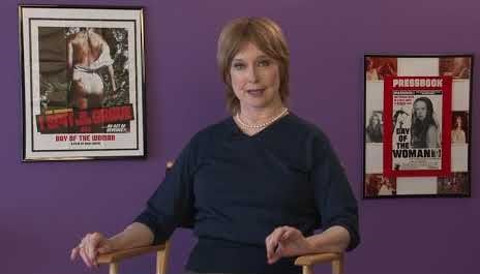
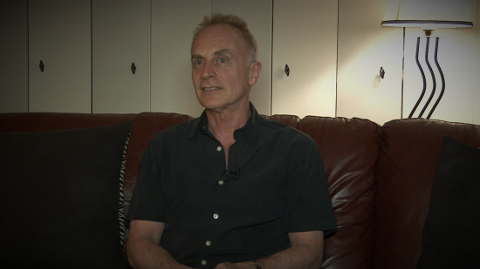
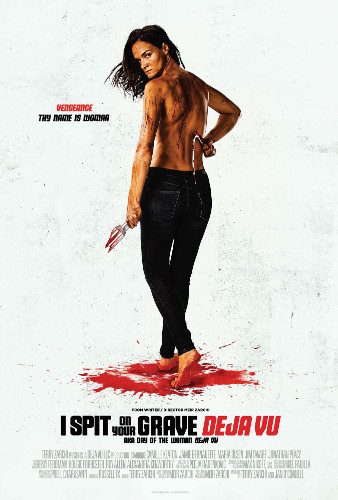
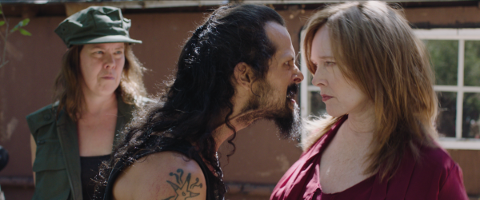
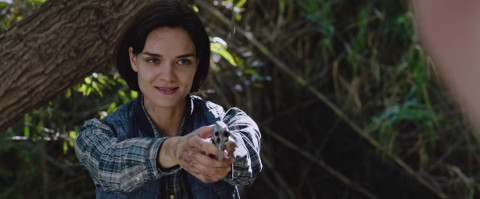

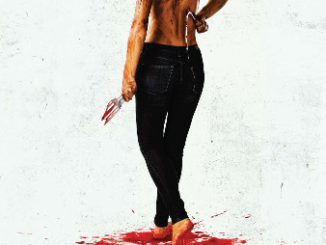
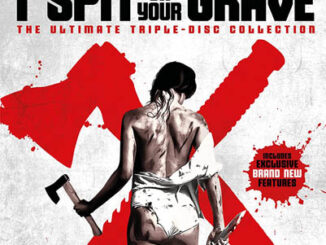
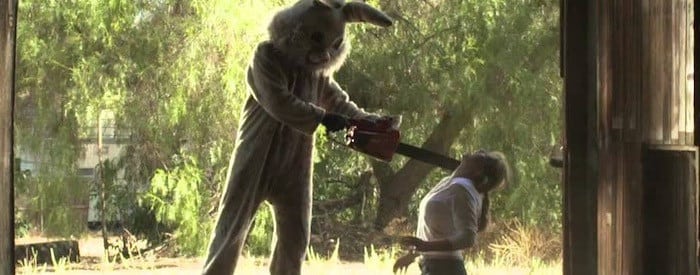
Be the first to comment